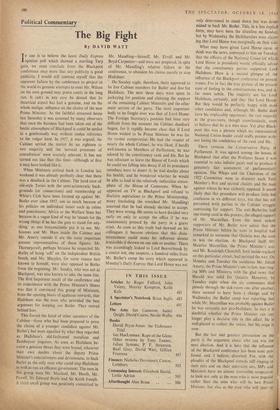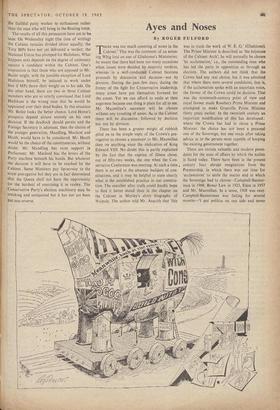Political Commentary
The Big Fight
By DAVID WATT IF one is to believe the latest Daily Express opinion poll which showed a startling Tory gain, we must conclude from the Blackpool conference once more that any publicity is good publicity. 1 would still contend myself that the apparent failure by the conference to project to the world its genuine attempts to meet Mr. Wilson on his own ground may prove costly in the long run. It can't in any case be denied that its theatrical aspect has had a genuine, and on the whole malign, influence on the choice of the new Prime Minister. As the faithful, streamed home last Saturday it was assumed by many observers that once the business had been taken out of the hectic atmosphere of Blackpool it could be settled in a gentlemanly way without undue reference to the vulgar herd. In 1957, it was argued, the Cabinet settled the matter by an eighteen to two majority and the 'normal processes of consultation' were scarcely relevant. It has not turned out like that this time--although at first it may have looked like it.
When Ministers arrived back in London last weekend it was already perfectly clear that there was a deadlock in the Cabinet. The hard core of old-style Tories with the semi-aristocratic back- grounds (or connections) and membership of White's Club have been formed up against Mr. Butler ever since 1957, not so much because of his policies on individual issues such as crime and punishment, Africa or the Welfare State but because in a vague kind of way he 'stands for the wrong things if he has the guts to stand for any- thing,' as one irreconcilable put it to me. Mr. Soames and Mr. Hare inside the Cabinet and Mr. Amery outside it are the most important present representatives of these figures. Mr. Thorneycroft, perhaps because he suspected Mr. Butler of being 'soft' on the independent British bomb, and Mr. Marples, for some reason best known to himself, were also opposed to Butler from the beginning. Mr. Sandys, who was not at Blackpool, was also known to take the same line. The first important result of the conference and its coincidence with the Prime Minister's illness was that it convinced this group of Ministers, from the opening blasts of applause onwards, that Hailsham was the man who provided the best argument for keeping out Butler. They moved behind him.
This forced the hand of other members of the Cabinet--those who had been prepared to press the claims of a younger candidate against Mr. Butler's but were appalled by what they regarded as Hailsham's old-fashioned moralism and flamboyant jingoism. As soon as Hailsham be- came a genuine threat they were bound, whatever their own doubts about the deputy Prime Minister's indecisiveness and deviousness, to back Butler as the only man who could stop Hailsham as well as run an efficient government. The men in this group were Mr. Macleod, Mr. Heath, Mr. Powell, Sir Edward Boyle and Sir Keith Joseph. A third small group was positively committed to Mr. Maudling—himself, Mr. Erroll and Mr. Boyd-Carpenter—and were not prepared, in spite of Mr. Maudling's relative failure at the conference, to abandon his claims merely to stop Hailsham.
On Sunday night, therefore, there appeared to be five Cabinet members for Butler and five for Hailsham. The next three days were spent in jockeying for position and claiming the support of the remaining Cabinet Ministers and the other main section of the party. The most important body to be fought over was that of Lord Home. The Foreign Secretary's position had been very difficult from the moment the Cabinet deadlock began, for it rapidly became clear. that if Lord Home wished to be Prime Minister he was far the easiest compromise. He had the respect of nearly the whole Cabinet, he was liked, if hardly well-known to Members of Parliament, he was adored by the constituency rank and file. But he was reluctant to leave the House of Lords which he could see falling into decay if all its prominent members were to desert it; he had doubts about his health; and he wondered whether he would be able to lead in the relatively unfamiliar atmos- phere of the House of Commons. When he appeared on TV at Blackpool and refused to disclaim aspirations to the Prime Ministership, many (including the wretched Mr. Maudling) assumed •that he had already decided to accept. They were wrong. He seems to have decided very early on only to accept the office if he was unanimously pressed by the party in a grave crisis. As soon as this truth had dawned on his colleagues it became obvious that this disin- terestedness could make his influence almost irresistible if thrown on one side or another. There was accordingly leaked to Lord Beaverbrook by a source not, one suspects, a hundred miles from Mr. Butler's camp the story which appeared in Monday's Daily Express that Lord Home was not only determined to stand down but was deter• mined to back Mr. Butler. This, in a less explicit form, may have been the situation on Sunday, but by Wednesday the Hailshamites were claim• ing that Lord Home was marginally on their side.
What may have given Lord Home cause to think was the news, conveyed to him on Tuesday, that the officers of the National Union (of which Lord Home is president) would officially advise that the constituency parties supported Lord Hailsham. Here is a second glimpse of the influence of the Blackpool conference on present events. For in fact the true picture of the present state of feeling in the constituencies was, and is, fat more subtle. The majority are for Lord Hailsham, certainly, and they like Lord Home. But they would be perfectly happy with most other candidates and, although Mr. Butler does have his Implacable opponents, the vast majority at the grass-roots, though unenthusiastic, seem to believe that he is a wise man. Yet after Black- pool this was a picture which no conscientious National. Union leader could really present with- out losing the confidence of the rank and file.
There remains the Conservative Party in Parliament. It was agreed among the bosses at Blackpool that after the Profumo fiasco it was essential to take infinite pains and to produce a genuinely fair assessment of parliamentary opinion. The Whips and the Chairman of the 1922 Committee were to discover each Tory Member's first and second choices and the man against whom he was violently opposed. It .seem likely that this procedure will produce little but confusion in six different keys, but that has not prevented both parties in the Cabinet struggle canvassing for support. The anti-Butlerites had one trump card in this process, the alleged support of Mr. MacMillan. Even the most ardent supporters of Mr. Butler now admit that the Prime Minister before he .went to hospital had remarked to someone that Quintin was the man to win the election. At Blackpool itself Mr Maurice Macmillan, the Prime Minister's son, and Mr. Randolph Churchill, both inside-trackers on this particular circuit, had pointed the way. On Monday and Tuesday • the assiduous Mr. Julian Amery, the Prime Minister's son-in-law, was ring. ing MPs and Ministers with the glad news that Harold was solid for Quintin. However, by Tuesday night when the six contestants filed piously through the sick-room one after another, there seemed to have been a change and by Wednesday the Butler camp was reporting that while Mr. Macmillan was probably against Butler he was certainly not pro-Hailsham. In fact it is doubtful whether the Prime Minister can any longer play a decisive role in this affair. He is well-placed to collect the voices. but his reign is over.
But the last and greatest persuasion on the .party is the argument about who can win the next election. And it is here that the influence of the Blackpool conference has been most pro found, and, 1 belieVe, distorted. For, with the plaudits of the Blackpool crowds still ringing in their ears and on their television sets, MPs and Ministers have an almost irresistible temptation to look not only at the man who is most popular rather than the man who will be best Prime Minister, but also at the man who will spur op the faithful party worker to enthusiasm rather than the man who will bring in the floating voter.
The results of all this persuasion have yet to be.
seen. On Wednesday night (the time of writing) the Cabinet remains divided about equally; the Tory MPs have not yet delivered a verdict; the National Union has plumped for Hailsham. What happens next depends on the degree of animosity against a candidate within the Cabinet. One's impression is that those who are opposed to Mr. Butler might, with the possible exception of Lord Hailsham himself, be induced to work under him if MPs threw their weight on to his side. On the other hand, there are two or three Cabinet members who are so utterly convinced that Lord Hailsham is the wrong man that he would be appointed over their dead bodies. In this situation Mr. Butler looks the better chance. Lord Home's prospects depend almost entirely on his own decision. If the deadlock should persist and the Foreign Secretary is adamant, then the claims of the younger generation, Maudling, Macleod and Heath, would have to be considered. Mr. Heath would be the choice of the constituencies, without doubt; Mr. Maudling has most support in Parliament; Mr. Macleod has the levers of The Party machine beneath his hands. But whatever the decision it will have to be reached by the Cabinet. Some Ministers pay lip-service to the royal prerogative but they are in fact determined that the Queen shall not have the opportunity (or the burden) of exercising it in. reality. The Conservative Party's election machinery may be creaking and antiquated but it has not yet been put into reverse.



































 Previous page
Previous page